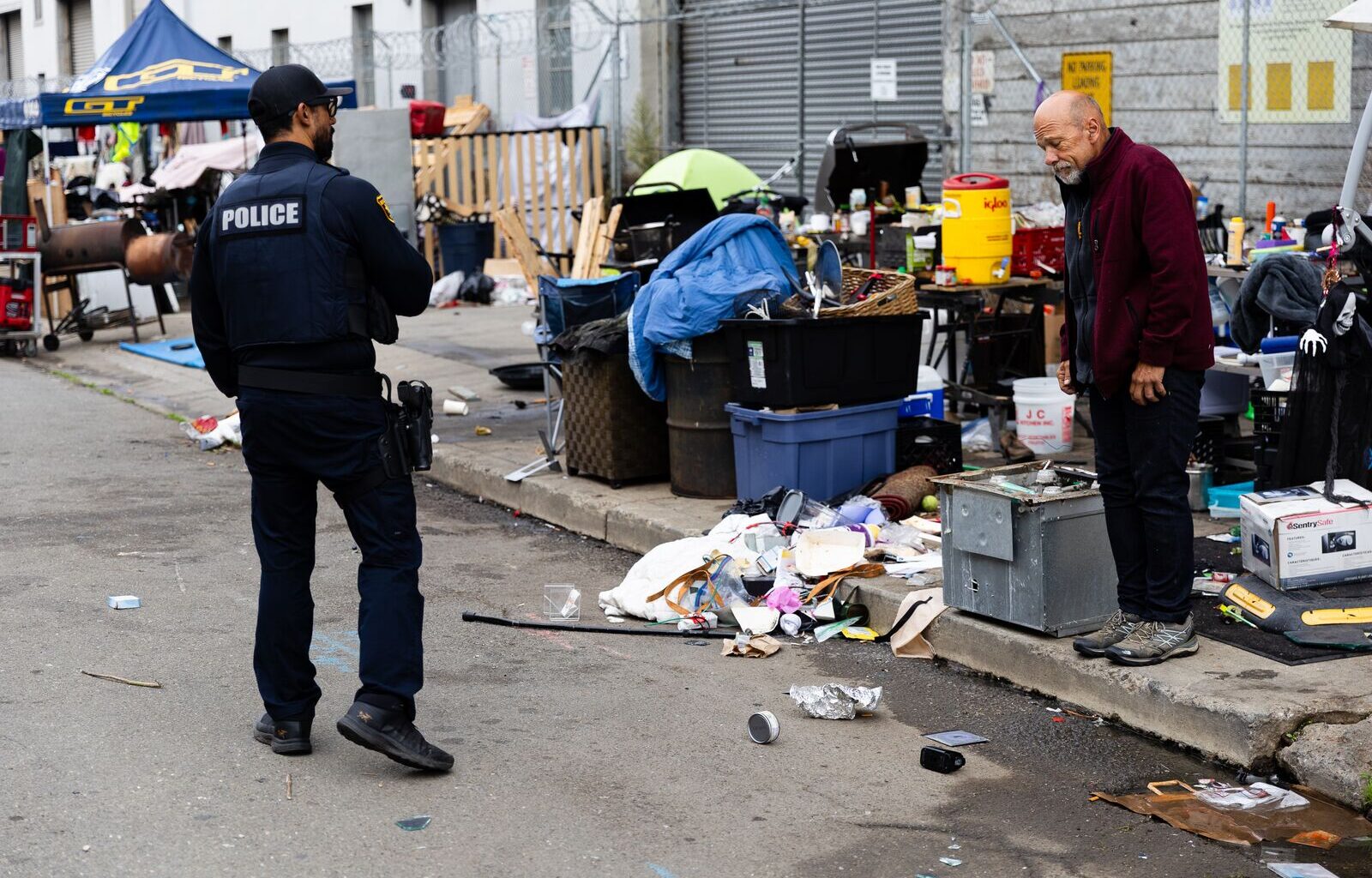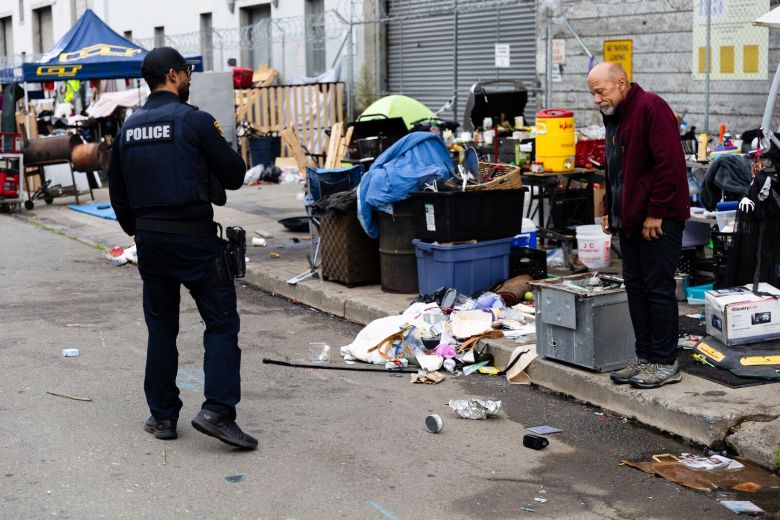 A Berkeley police officer speaks last week with Robert Piraino Sr., who lived in an encampment on a portion of a West Berkeley street the city gave to Bayer. The encampment was cleared early Tuesday. Credit: Estefany Gonzalez for Berkeleyside
A Berkeley police officer speaks last week with Robert Piraino Sr., who lived in an encampment on a portion of a West Berkeley street the city gave to Bayer. The encampment was cleared early Tuesday. Credit: Estefany Gonzalez for Berkeleyside
Bayer has evicted the residents of a homeless encampment on a stretch of a West Berkeley street that the city turned over to the pharmaceutical giant earlier this year.
The sweep before dawn on Tuesday was the moment camp residents had feared since the Berkeley City Council approved a plan this summer to give up a roughly 380-foot stretch of public roadway at the west end of Carleton Street, an industrial block that dead-ends at the 46-acre Bayer campus. The company, which is Berkeley’s largest private-sector employer, already owns properties on both sides of the street, and has acquired portions of several other nearby streets from the city; it took ownership of the portion of Carleton Street this month.
Roughly a dozen people lived in cars, recreational vehicles, tents and other shelters at the encampment, which Bayer officials said was a source of problems, such as fires that sent smoke into the company’s nearby facilities.
City outreach workers and police had been telling campers since Oct. 20 that they needed to leave the site, according to Bayer spokesperson Jennifer Cogley.
Some heeded the warning and moved elsewhere last week anticipating that a sweep was imminent. But with no specific notice of when the camp would be cleared, others told Berkeleyside they were caught by surprise when they were awoken around 6 a.m. Tuesday and told to leave immediately, with little time to pack up their items.
“They basically came and said, ‘Get out … if you don’t leave, you’re going to jail,’” said Travonnie Stokes, who had lived at the site for several months.
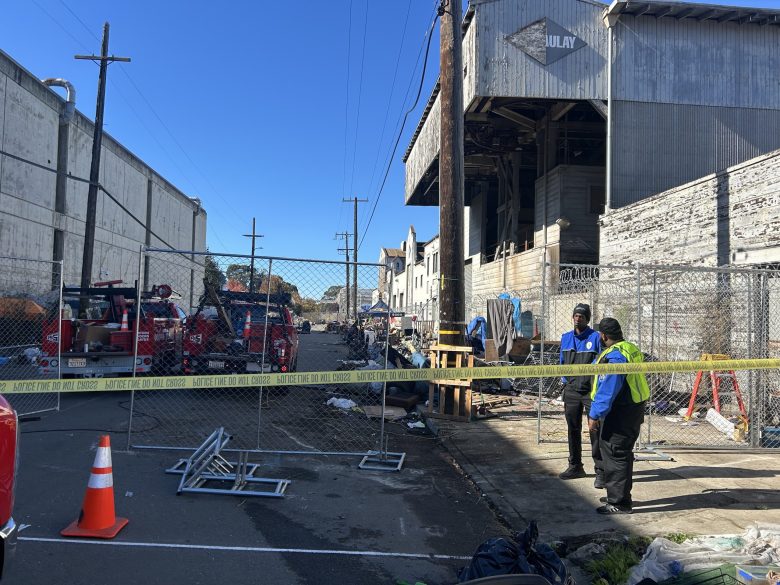 Security guards watch over the portion of Carleton Street owned by Bayer on Tuesday, hours after residents of a homeless encampment on the block said they were woken up before dawn and told to leave, with little time to collect their items. Credit: Nico Savidge/Berkeleyside
Security guards watch over the portion of Carleton Street owned by Bayer on Tuesday, hours after residents of a homeless encampment on the block said they were woken up before dawn and told to leave, with little time to collect their items. Credit: Nico Savidge/Berkeleyside
City spokesperson Matthai Chakko said one person was arrested when they refused to leave the street Tuesday morning, while 10 others left voluntarily.
By midday Tuesday a line of police tape, watched over by private security guards, cordoned off the block at Bayer’s new property line as workers assembled a chain-link fence to keep people out of the area. Behind them, many of the encampment’s structures, trash and at least one RV were still visible.
When the city manages an encampment closure, its staff will store certain items for unhoused residents who can’t carry all of their belongings. But Cogley said Bayer would not allow residents back onto the street to retrieve any belongings they left behind.
“People living on Carleton have been made aware of the need to leave for more than a week,” Cogley wrote in an emailed statement. “While we empathize with those in this difficult situation, we believe that encampment members have had ample notice to vacate the area.”
Some residents got four-week hotel stay
Bayer offered residents who had been living at the site around the time the city vacated the land last July a free 28-day stay in a local motel as part of the encampment closure, Cogley said, but did not extend that offer to people who moved to the site more recently. Stokes and some others who spoke with Berkeleyside disputed that, saying they were not offered shelter despite being long-time residents.
Chakko wrote in an email that city homeless outreach staff were in contact with 16 people in the Carleton Street area, and offered 12 of them shelter; seven people moved into the shelter, and he described one person as “pending.”
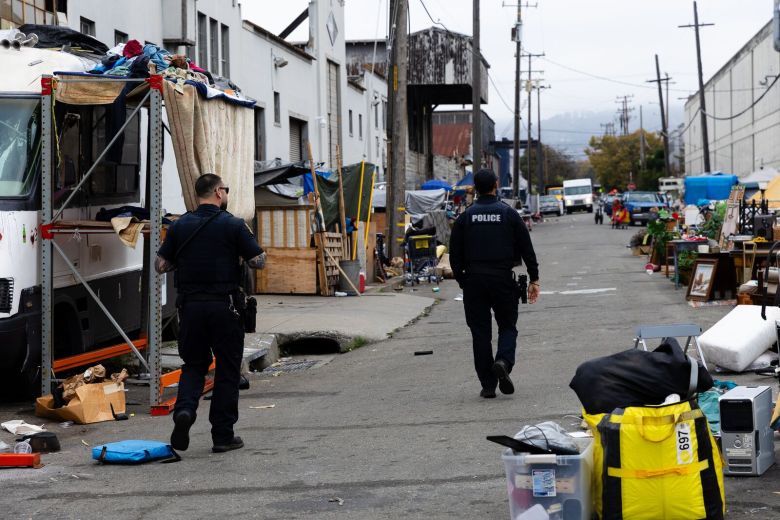 The Berkeley City Council approved a deal in July to turn over a formerly public portion of the 800 block of Carleton Street to Bayer. Credit: Estefany Gonzalez for Berkeleyside
The Berkeley City Council approved a deal in July to turn over a formerly public portion of the 800 block of Carleton Street to Bayer. Credit: Estefany Gonzalez for Berkeleyside
Chakko has not responded to questions from Berkeleyside about another encampment nearby — a collection of RVs and cars parked along the frontage road between the bay and the Eastshore Freeway, near the Ashby Avenue on-ramp — that appears to have been swept recently.
The Berkeley City Council adopted a policy last year giving city workers more authority to sweep homeless encampments without offering their residents shelter elsewhere, taking advantage of the powers granted to local governments by a controversial U.S. Supreme Court ruling. That policy likely would not have applied to the Carleton Street encampment once the road became Bayer’s private property. City leaders have acknowledged Berkeley does not have enough shelter beds to accommodate the hundreds of people living on its streets.
A camp resident who goes by Cowboy, and maintained a collection of furniture, clothing and decor on the street, took the offer for a motel stay in Berkeley. Cowboy, who declined to share his legal name, said he plans to move in the coming weeks from the motel into a permanent apartment he secured with help from the nonprofit Bay Area Community Services.
Another resident, Alice Nevins, agreed to move into a hotel near Oakland’s Jack London Square.
“I wasn’t sure what to do,” Nevins said, adding that she appreciated the way Bayer handled the encampment. “I liked having them as neighbors.”
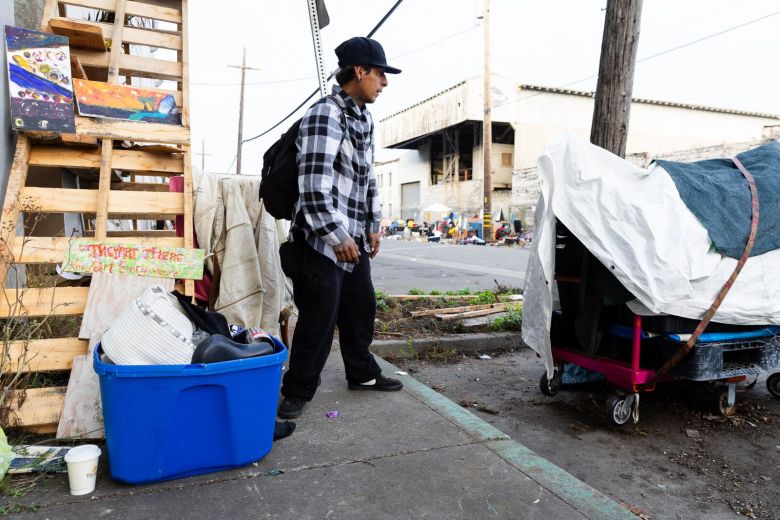 Jonathan Cubis prepares to leave the encampment at the west end of Carleton Street after hearing about an impending sweep last week. A painter and handyman, Cubis was one of several artists who lived at the camp. Credit: Estefany Gonzalez for Berkeleyside
Jonathan Cubis prepares to leave the encampment at the west end of Carleton Street after hearing about an impending sweep last week. A painter and handyman, Cubis was one of several artists who lived at the camp. Credit: Estefany Gonzalez for Berkeleyside
Uncertainty for those with no shelter offer
Jonathan Cubis summed up the position of many of those who weren’t offered a room when he spoke with a reporter last week.
“At this moment, I’m lying if I say I know what I’m going to do,” Cubis said, standing next to his belongings in a small park around the corner from the encampment. A painter, tattoo artist and handyman who often cooked for residents in the camp, Cubis had moved many of his belongings off Carleton Street on Thursday.
Other residents told Berkeleyside they would likely find another place to camp nearby and move there. Homeless advocates argue encampment policies in Berkeley and other cities have the effect of pushing unhoused residents from place to place through disruptive and inhumane sweeps, without addressing why people are living on the streets.
 Travonnie Stokes at the Carleton Street encampment in August. Stokes said he was not offered the 28-day motel stay other camp residents received. Credit: Daniel Ekonde/Berkeleyside
Travonnie Stokes at the Carleton Street encampment in August. Stokes said he was not offered the 28-day motel stay other camp residents received. Credit: Daniel Ekonde/Berkeleyside
Stokes said he did not know why he wasn’t offered a motel room. Then again, he said, moving into the motel would likely mean giving up many of his belongings in an exchange for a stay that would only last a few weeks — and end when the weather would be colder in late November.
Stokes shared a cigarette with another former camp resident at the corner of Carleton and Seventh streets Tuesday afternoon. They weren’t sure where they would go next, though Stokes was hoping he would be allowed back into the camp. He had to leave his tent, socks, bed and food behind in his shelter, Stokes said, and he wasn’t sure if his cellphone was back there too.
“I was only able to grab a couple of things,” he said.
Related stories
Bayer says 2 a.m. horn blasts were boiler alarms, no threat to neighbors
December 9, 2024Dec. 10, 2024, 1:42 p.m.
Bayer says boiler alarm sounded Tuesday, no risk to public
March 29, 2023March 30, 2023, 2:03 p.m.
Injured contractor dies weeks after Bayer fire
March 1, 2023March 6, 2023, 12:54 p.m.
“*” indicates required fields

